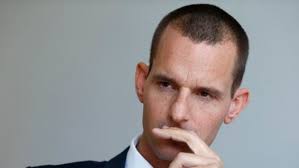By Andrew Warshaw
September 13 – Cornel Borbely (pictured), FIFA’s former ethics investigations chief whose work brought down a string of corrupt officials, has been barred from giving evidence to a British parliamentary committee, blatantly calling into question FIFA’s insistence it has nothing to hide and that the dark days of corruption are over.
On the day Miguel Maduro, FIFA’s former governance guru and Portuguese government minister, part of whose job was to vet candidates for senior FIFA positions, blew the lid off FIFA’s commitment to reform, it emerged that a similar request for Borbely to testify in order to serve the public interest was firmly rejected by FIFA because of confidentiality rules.
In a letter dated August 17 and sent directly to FIFA president Gianni Infantino, Britain’s Culture, Media and Sport Select Committee asked for permission to approach Borbely to appear as a witness as part of an ongoing inquiry into sports governance.
His testimony would have been protected by parliamentary privilege but six days after the request, in correspondence seen by Insideworldfootball and other media organisations, FIFA secretary general Fatma Samoura – and not Infantino – replied by saying Borbely, controversially removed by FIFA last May, was bound by the same code of ethics which he ironically used to scrutinise himself.
Insideworldfootball understands Borbely had expressed a willingness in theory to take part – just like Maduro did today when he took the view that being asked to address a national parliament outweighed any confidentiality clauses.
Samoura’s response warned, however, that Borbely would be in breach of the FIFA code of ethics by appearing and that he could potentially break Swiss civil and criminal law. Yet she herself faces accusations of breaching FIFA’s ethics rules by not referring the matter to the ethics committee, perhaps for fear it might have given the green light for Borbely to provide uncomfortable evidence about what it was like working for FIFA before he was unceremoniously ditched.
Maduro expressed “extreme surprise” at Samoura’s stance, saying her interpretation of the rules was a classic example of FIFA’s governance problems.
“FIFA should immediately have forwarded your request to the ethics committee,” he told Parliamentarians. “It’s the judicial bodies that decide on the extent of the obligation of their members.”
It is understood that Maduro had informed the ethics committee in advance that he was going to speak. Borbely, on the other hand, apparently made it clear – understandably given the delicate position he was in – that he would need FIFA’s consent first.
Contact the writer of this story at moc.l1745288187labto1745288187ofdlr1745288187owedi1745288187sni@w1745288187ahsra1745288187w.wer1745288187dna1745288187

